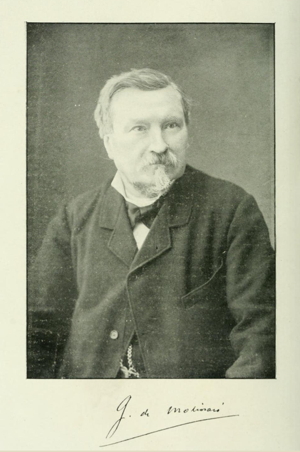As part of the bicentennial celebrations of the birth of Gustave de Molinari, the world’s first true anarcho-capitalist, I wrote the following paper: “Was Molinari a true Anarcho-Capitalist?: An Intellectual History of the Private and Competitive Production of Security” a paper given at the Libertarian Scholars Conference, New York City, 28 Sept. 2019. http://davidmhart.com/liberty/Papers/Molinari/ProductionSecurity/index.html>]
The paper explores two topics relating to Gustave de Molinari’s pathbreaking article “De la production de la sécurité” (On the Production of Security) (JDE, Feb. 1849). The first is an exploration of the intellectual history leading up to this theoretical breakthrough, that private insurance companies in a competitive free market, or “les producteurs de la sécurité” (producers of security) or “entrepreneurs in the security industry,” can and would be able to supply protection of life, liberty, and property, in other words police and national defense services, to private individuals, or “les consommateurs de la sécurité” (consumers of security), by voluntarily charging premiums for their services in a competitive market. The deeper roots of Molinari’s idea lay in the work of Destutt de Tracy and J.B. Say in the 1810s on the question of whether or not government activity was “productive” and if so, in what way. Closer to his own time, the conservative politician Adolphe Theirs and the socialist publisher Émile de Girardin in the late 1840s both likened the state metaphorically speaking to an “insurance company” which provided services to taxpayers/shareholders who paid taxes/premiums to that company.
Molinari’s contribution to the debate was to see how the metaphor could be turned into reality, where actual private property insurance companies (“les compagnies d’assurances sur la propriété” (property insurance companies) ) would contractually and voluntarily provide protection services to their policy holders. Molinari first developed his ideas in a series of articles and books written between 1846 and 1855 (the article “Le droit électorale” Courrier français (July, 1846); the article ” in JDE, Feb. 1849; Soirée 11 inLes Soirées de la rue Saint-Lazare(1849); scattered references in several articles he wrote for the Dictionnaire de l’économie politique (1852-53); the chapter on “Public Consumption” (Douzième leçon, “Les consommations publiques,” in his treatise Cours d’économie politique (1855)), and then returned to the topic again later in the 1880s and 1890s (the chapter Chap. X “Les Gouvernements de l’avenir,” in L’Évolution politique et la Révolution (1884); his book on Esquisse de l’organisation politique et économique de la société future (Sketch of the political and economic organisation of the future society (society in the future)) (1899); and the late article “Où est l’utopie?” (Where is Utopia?) (JDE, 1904).
The second topic to be explored is the question of how much of an “anarcho-capitalist” Molinari really was and whether or not he remained one over the course of his long life. The term itself is anachronistic to use about Molinari as it was coined by Rothbard to describe his own views which were emerging in the 1950s and 1960s under the influence of Molinari’s original 1849 article, along with the writings of other members of the Paris School of economists, such as Charles Dunoyer, Charles Comte, and Frédéric Bastiat. Molinari himself referred to his views as “la liberté de gouvernement” (the liberty of government, or free government) or “la concurrence politique” (political competition, or competing governments). I will argue that Molinari was a “true” or “hard” anarcho-capitalist when it came to the question of the private production and provision of police and defense services (“la sécurité) – for which he used the very “capitalist” expressions such as “producers of security,” “consumers of security,” the “security industry,” “entrepreneurs in the security industry,” etc – until he reached his seventies when he “backtracked” slightly during the 1890s. He was also a “true” or “hard” anarcho-capitalist when it came to the question of the private production and provision of justice by means of competing law courts which charged “fees for service” and remained one for his entire life. He had several insights about how law might evolve privately but he did not develop it as far as he did with the private production of security. My conclusion is that he came came very close to being an early (perhaps the first) “Rothbardian anarcho-capitalist” but did not go all the way there. This fact in itself was quite extraordinary for his day and age and his achievements should be duly recognized by historians and economists.

